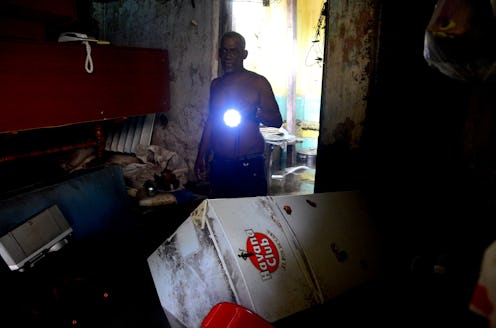News
The Type Of Hurricane Irma Damage That’s Deadlier Than You Think

Hurricane Irma left parts of the Caribbean and south Florida utterly destroyed. The largest hurricane on record in the Atlantic downed trees, decimated houses, and killed at least 55 people. Floridians have made it through some of the worst conditions, but there is now another danger at hand — power outages caused by Hurricane Irma. As many as 15 million residents of the Sunshine State are still without power, and the restoration process could take weeks. With news that six residents of a nursing home have died, possibly due to lack of air conditioning, restoring power feels even more urgent.
Losing power is a universal annoyance, but for certain populations, it can also be life threatening. For the very young and very old, a loss of heating or air conditioning can be extremely dangerous. And with one in five Floridians being a senior citizen, the risk of prolonged power outages poses a more severe threat.
There are other complicating factors when it comes to power outages and the elderly. Many of them rely on electricity for such life-saving treatments as dialysis. While the full scope of Irma's impact remains to be seen, a study from Hurricane Sandy reveals that power outages caused roughly 26.3 percent of those surveyed to miss a dialysis treatment.
For people dependent on dialysis, missing even one day can increase the risk of hospitalization, medical complications, and even death. It is for this, and a great many other obvious reasons, that the imperative to get power back up and running takes precedence at hospitals and other medical facilities.
But that is where another tangential problem from power outages arises. For the millions of people stuck at home with no power, a backup generator is often a life-saver. However, generators are themselves dangerous machines. They must be kept outside, in order to properly ventilate.
On Tuesday, three Florida residents from the same family tragically died from being poisoned by gas fumes from a generator that had been brought inside. There are several other members of the affected family who have been hospitalized for carbon monoxide poisoning. Another man in Miami-Dade county died from the same cause.
Power outages are also incredibly dangerous because of the debris left in their wake. Hurricane Irma knocked down countless electrical poles, and that destruction can lead to a high-risk of electrocution. Brian Buwalda, a 51-year-old Orlando resident, died from electrocution while reportedly helping another family set up a tarp, due to a downed electrical pole.
To stay safe during a power outage, the most important thing is to be prepared. There are no guarantees about when power will be restored, so having a backup plan ahead of time is a must. It's also crucial to remember that backup generators must always remain outside. Carbon monoxide poisoning can be and often is fatal.
One often overlooked danger from a power outage is that of electrocution. If a downed power line ends up in a pool or small puddle of water, it can make that entire area a no-go zone. United Power suggests you always assume a downed pole contains a live wire, and stay well back from its area.
For some Florida residents, surviving the power outages came down to small things. Senior citizens at Cape Coral Shores stayed put for Hurricane Irma. They managed to get through the next few days without power by opening windows and turning on a few small fans. According to Dan Nelson, Cape Coral Shores' chief operating officer, those little fans were quite literally a life saver for the assisted care facility's many residents.
With any luck, Florida will get all of its power back up and running soon. Until then, staying safe and keeping cool is priority number one in the Sunshine State.